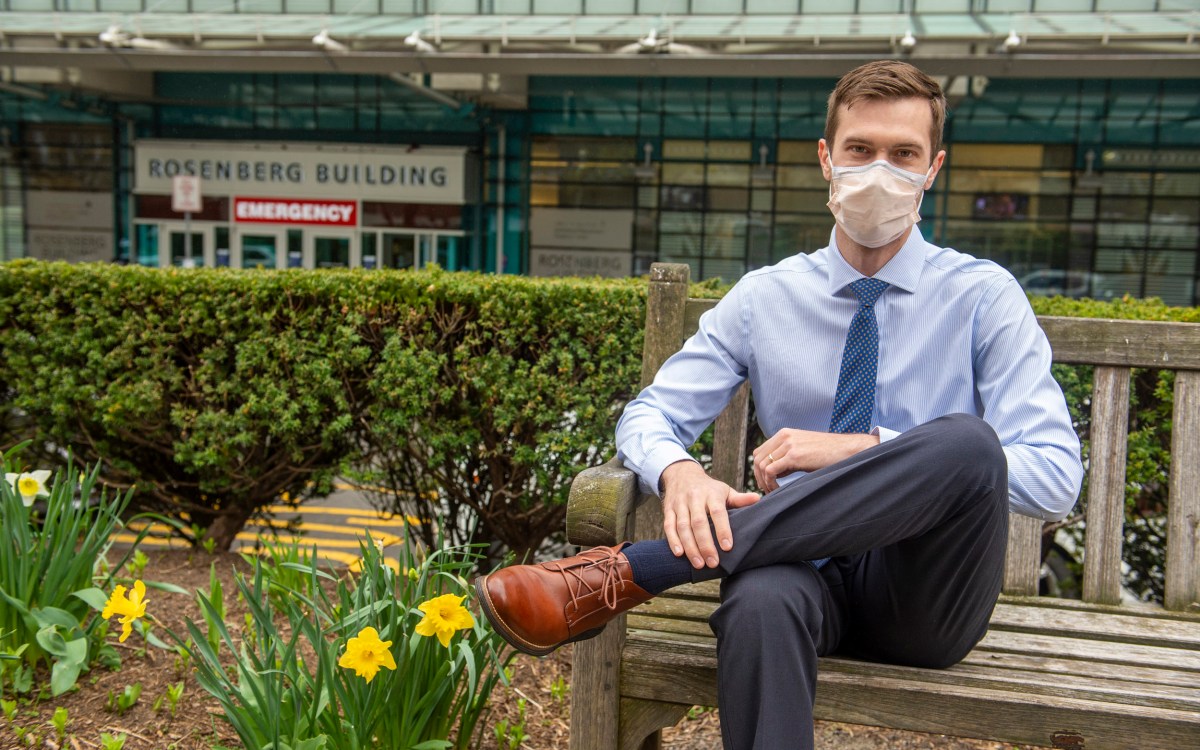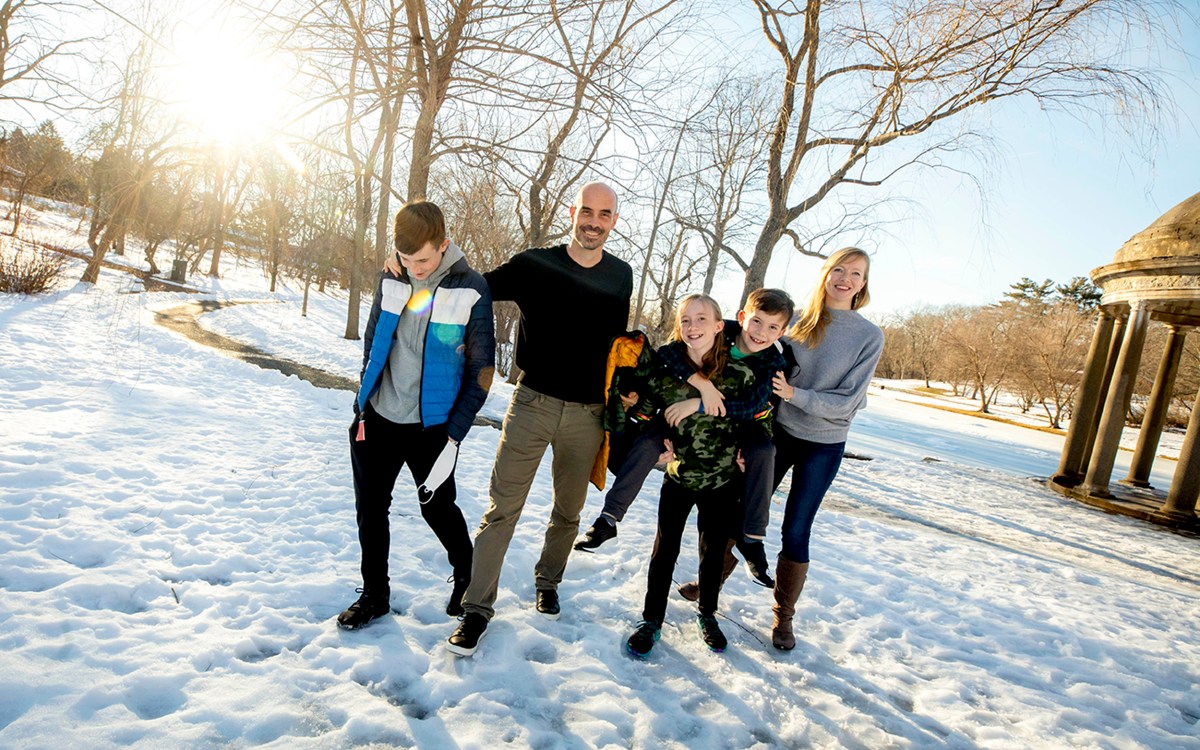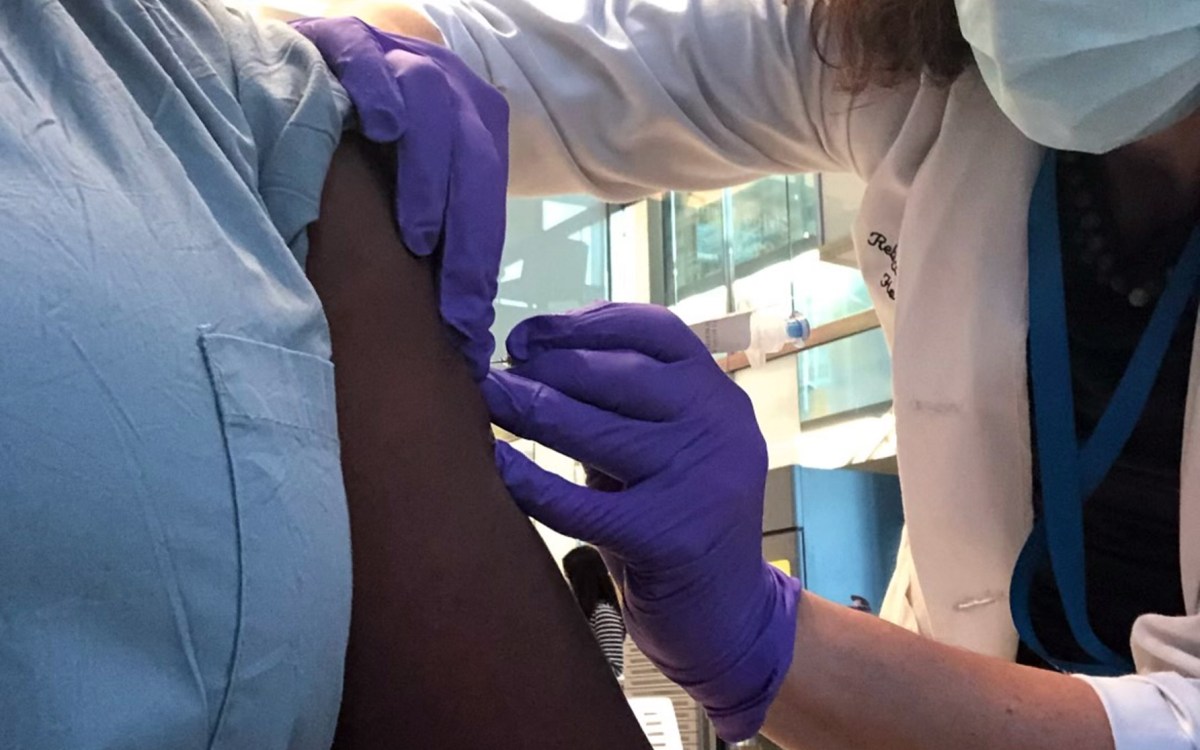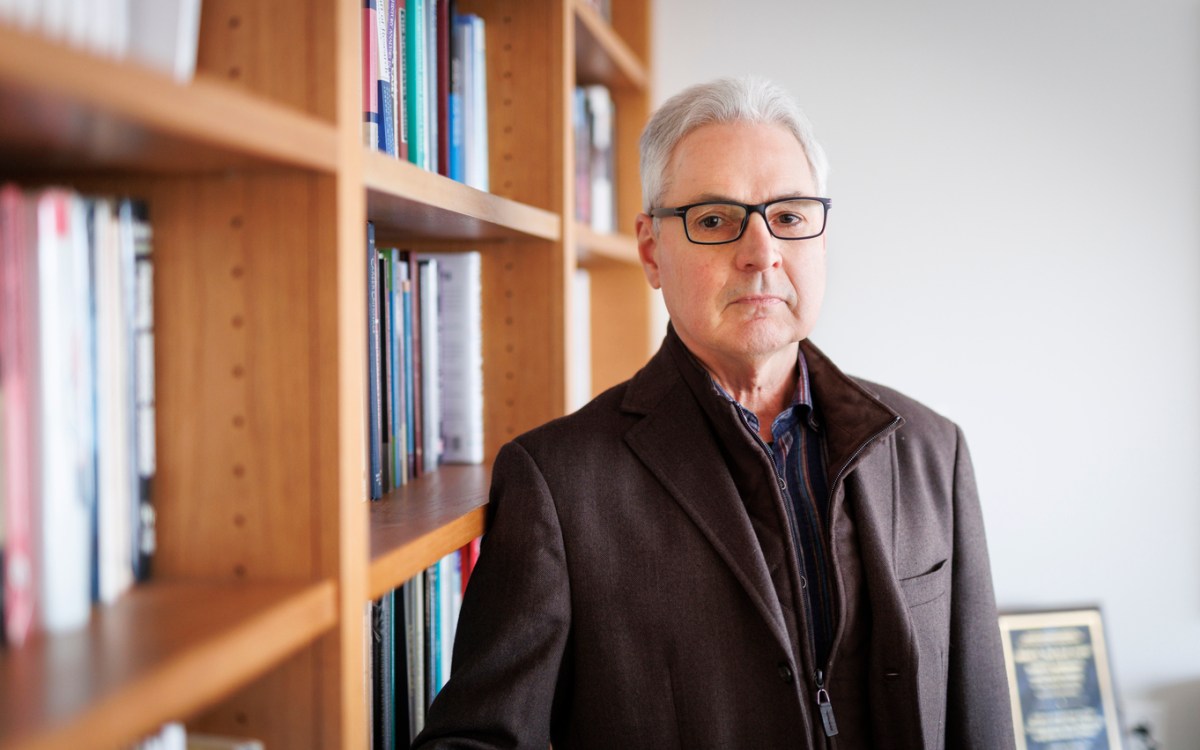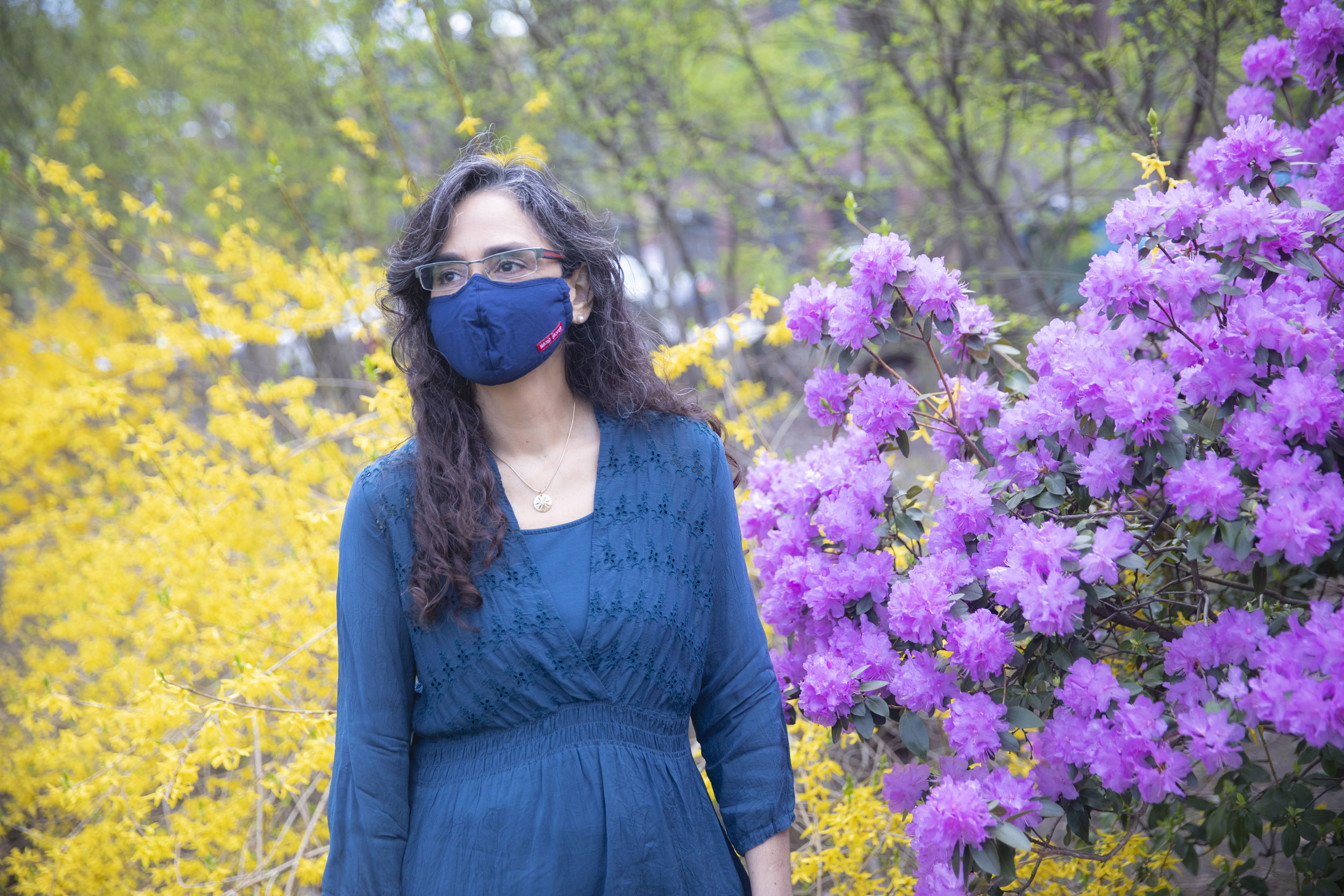
Marcia Castro is the Andelot Professor of Demography, Global Health and Population at Harvard T.H. Chan School of Public Health.
Kris Snibbe/Harvard Staff Photographer
Why the COVID-19 outbreak in Brazil has become a humanitarian crisis
Chan School’s Castro says the factors are many, but biggest may be failure of leadership, denial of science
The COVID pandemic is ravaging Brazil, where it has killed nearly 400,000 people, a death toll exceeded only by the U.S. Recently, Doctors Without Borders described the public health crisis in South America’s largest and most populous nation as a humanitarian catastrophe, blaming government leaders for the nation’s “failed COVID-19 response.” The Gazette spoke with Marcia Castro of the Harvard T.H. Chan School of Public Health about the lessons the rest of the world can take from Brazil’s plight. Castro, a native of Brazil who has done extensive work in the Brazilian Amazon, is the Andelot Professor of Demography.
Q&A
Marcia Castro
GAZETTE: What are the factors driving the COVID-19 crisis in Brazil right now?
CASTRO: I wish there was a single factor to explain this crisis, but there are many factors behind the outbreak in Brazil, which is a large, unequal, and complex country. There is the issue of inequality, not just income inequality, but local inequalities reflected in unequal access to both health services and ICU beds, and the presence of comorbidities that disproportionately affect people who are more vulnerable. All of that matters because inequalities are a real challenge for any country when it comes to responding to a pandemic.
However, an important factor was the lack of a unified response at the federal level. Brazil has a universal health system, which operates at the federal, state, and municipal levels. Municipalities are in charge of implementing measures, but they do so by following federal and state guidelines and protocols. But what we saw in this pandemic was a complete rupture of this structure. We had no coordinated guidance or an effective plan to deal with the pandemic at the federal level. There was no scientific advisory committee to guide the government on the best course of action. Instead, we had President [Jair] Bolsonaro denying science, downplaying the seriousness of the virus, and promoting unproven treatments such as hydroxychloroquine, an anti-malaria drug. For many months, he didn’t wear a mask and met with crowds of supporters, and he has yet to be vaccinated.
Across Brazil, mayors and governors did whatever they could to respond to the pandemic. Those who supported the president didn’t take any action, and those from opposing parties went against the tide and are now entangled in disputes with the federal government. It’s unfortunate, but the story of COVID in Brazil is a story of how the failure of leadership has put Brazil in a completely chaotic situation. Right now, Brazil is experiencing a true humanitarian crisis.
GAZETTE: Some health experts are saying that this catastrophe in Brazil could have been avoided. What is your take on this?
CASTRO: I fully agree. This crisis could have been avoided. That doesn’t mean that we were going to have zero deaths, but certainly we wouldn’t have the death toll we’re having now. In life, there’s no rewind button, but using data to model alternative scenarios, we can show how things in Brazil would have turned out differently if the government would have imposed a lockdown and given sufficient emergency benefits to the population to stay afloat. The government gave cash assistance, but during the worst months of the pandemic, between January and March of 2021, they didn’t give anything.
Brazil could have given a lesson to the world on how to respond to a pandemic based on how it handled its response to the HIV/AIDS and Zika epidemics. Brazil has a universal health system and one of the largest community-based primary care programs in the world. It has more than 300,000 community health agents across the country that serve the most vulnerable population. They go to people’s houses to monitor diabetes, blood pressure, and check in on pregnant women. They could have been the backbone of the country’s response to COVID-19, and they could have been deployed across the country bringing the right information about preventive measures, and in doing so, this effort could have addressed the most vulnerable people who live in overcrowded houses without proper ventilation, the ones who are at most risk. But we missed the opportunity to use this network of community health agents, which could have given us some advantage in the initial response.
“It’s unfortunate, but the story of COVID in Brazil is a story of how the failure of leadership has put Brazil in a completely chaotic situation. Right now, Brazil is experiencing a true humanitarian crisis.”
GAZETTE: You have said that the public health crisis in Brazil is a warning to the world. Can you explain?
CASTRO: The world has to look at what happens when you let a pandemic go unmitigated and learn from it. What we’re seeing is a very high death toll and the emergence of new variants because variants are going to emerge in places that have high transmission. There is the P.1 variant, and there are two other lineages that have emerged already, and we don’t know if they’re going to become variants of concern. Due to the pandemic, Brazil has lost about two years of life expectancy at birth. In the U.S., experts say the loss in life expectancy is about 1.13 years.
GAZETTE: How does President Bolsonaro’s handling of the pandemic compare to other countries in the continent?
CASTRO: There are three governments that handled the early stages of the pandemic in a similar way. Brazil, Mexico, and the U.S. with Donald Trump were similar in their denial of how serious the virus was and their denial of science. It’s not by chance that those three countries are among the countries worst hit by the virus. The U.S. had a chance to change gears after the election of Joe Biden, and thank goodness for that. I doubt the U.S. would be vaccinating more than 4 million people a day if we hadn’t changed presidents. But in Mexico and Brazil nothing changed. What has changed is that with Trump out of the picture, the presidents of Mexico and Brazil can’t say that they’re doing what Trump is doing. Now they’re alone, and President Bolsonaro is feeling some pressure. Recently, the Brazilian Senate initiated an investigation into Bolsonaro’s handling of the pandemic, and hopefully there will be some accountability for what he has done and for what he did not do.
GAZETTE: How have the other countries in South America handled their responses to the pandemic?
CASTRO: I don’t know the details of how every country in South America responded, but I can tell you what I know. Uruguay prepared in advance; they expanded the number of ICU beds in hospitals in anticipation of the surge. Uruguay, and also Argentina, promoted social distancing early in the pandemic. Peru also enacted a lockdown early on, but like other Latin American countries it’s pretty unequal. Many people lack a fridge, which led to crowded markets where the virus spread. That’s an example of what happens when you’re trying to do the right thing, but you ignore the local inequalities; your measures are not going to work. Chile is vaccinating a large sector of its population, but they have detected the P.1 variant, and cases are increasing again. Across South America, we see a difference in both the timing and the characteristics of the response. Unfortunately, some of the measures implemented didn’t really do much because they neglected the local inequalities. Latin America is one of the most unequal regions in the world. We can’t blindly apply measures from Europe or other developed countries and expect that they would work in Latin America.
GAZETTE: What is the status of the vaccination efforts in Brazil?
“As far as I know, viruses don’t respect borders. … the rich countries, which hold the resources and the technology to produce vaccines, should be thinking about this in a global way, not in a ‘not-in-my backyard’ way.”
CASTRO: As of now, 12 percent of Brazil’s population has received at least one dose of the vaccine, but only 7 percent has received two doses. The tragedy is that Brazil has a national immunization program that is regarded as very successful. Brazil can vaccinate 10 million children in one day against polio. I don’t know of any other country that can do that. When we had the threat of H1N1 in 2010, Brazil vaccinated 80 million people in three months. Brazil knows how to do vaccination campaigns, but we just don’t have the vaccines to put into people’s arms. Brazil had the chance last year to secure vaccines from Pfizer, but Bolsonaro didn’t want them. He refused the Sputnik vaccine because Trump didn’t want to get the vaccine from Russia, and he didn’t want the vaccine from China either. We have had four ministers of health since the pandemic began, and recently Bolsonaro said that he was going to get vaccines from Pfizer and Johnson & Johnson, but we have no idea when they are going to arrive. We are really behind schedule. We missed the opportunity to secure more doses last year, and that was a big mistake.
But the entire Global South is lagging behind when it comes to vaccines. That’s the geopolitics of vaccines. I think it begs a big discussion. I don’t think any rich country can deny the fact that there is a huge issue of geopolitics involved. Everybody wants to vaccinate their population first and then look at the Global South. I’d say to the rich countries that they should look at what’s happening in Brazil. We can have more variants emerging that are more transmissible and far more lethal. As far as I know, viruses don’t respect borders. The pandemic is a global health emergency and a humanitarian crisis, and the rich countries, which hold the resources and the technology to produce vaccines, should be thinking about this in a global way, not in a “not-in-my backyard” way.
GAZETTE: Brazil is your country of birth. How is the crisis affecting you?
CASTRO: I just wrote a paper on the effects of the pandemic on the life expectancy in Brazil, and I had never felt what I felt. I’ve done work in malaria, dengue, and Zika, but this was the first time when I felt rage, and I had never felt this way before. It’s infuriating because I know I’m writing about something that could have been a completely different story. Experts are trying to advance science and are producing knowledge to solve real problems, but the person in Brazil that can use it to address the pandemic refuses to use it and doesn’t want to listen to science.
I have family in Brazil. I lost my father last year not to COVID-19 but to something else, and I traveled because I had to be with my mom. When I arrived there I had to quarantine, and I wanted to hug her, and I couldn’t hug her. I’m always worried. My immediate circle has been vaccinated, but my goddaughter, who is like a daughter to me, is pregnant, and I worry about her. But all these worries could have been avoided. Brazil taught a lesson to the world when we had the HIV/AIDS epidemic in the 1990s, and we could have been doing the same right now. But I’m going to continue using my voice to keep pushing for a response based on science.
GAZETTE: If you were the [Director of the U.S. National Institute of Allergy and Infectious Diseases Anthony] Fauci of Brazil, what would you suggest the government of Brazil do?
CASTRO: What has to be done? First, Brazil needs to impose a lockdown, but it has to be accompanied by emergency relief assistance to vulnerable families. At the same time that we do this, we need to start planning what to do when cases go down. Last year, when cases started going down, the government did nothing. What they need to do is bring our community health agents into action and train them to do testing so that they can detect those who are sick and isolate them. If they do those two things, they’d have a really good shot of avoiding another wave. Those agents can also bring information on how to prevent the spread of COVID-19. That’s what I would do.
But in the absence of a response from the federal government, a coalition of governors and mayors are banding together to take the problem in their hands. Together, they cover more than 60 percent of the population in Brazil. I support their efforts because honestly, we can’t just sit down and wait for the federal government to do something. We’re seeing results from cities that implemented lockdowns and have had days without a single death. The Senate investigation is also an effort to bring accountability, and they’re willing to look at the science. I think there is hope around the corner. But the one thing that worries me is that Brazil is a huge country of over 200 million people with 5,570 municipalities. There are many municipalities that are not part of this coalition, and they may fall behind. We’ll see what this coalition of mayors and governors can do. It is better than the alternative, which is nothing.
The interview has been edited and condensed for length and clarity.



